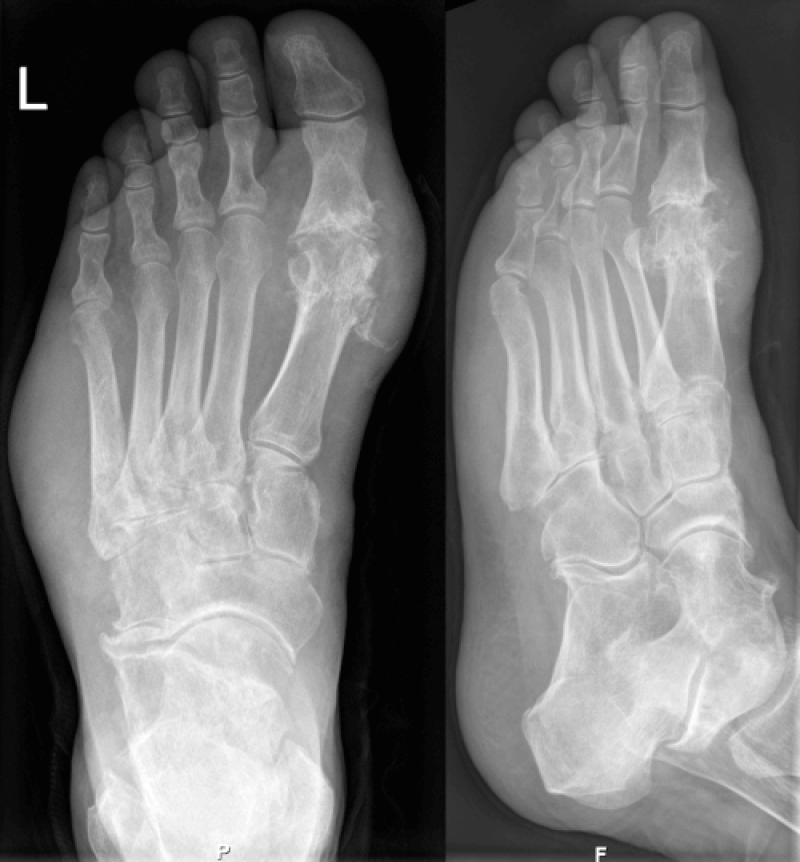It looks like we can add gout to list of problems the imperfect tinkering of natural selection has gifted us with.
Gout — a painful swelling of the joints, called the “disease of kings” for its cultural association with leisure — is caused by an excess of uric acid in the blood. We expel uric acid through our urine, but we do not produce uricase, an enzyme that breaks down excess uric acid in the blood. This is a problem unique to primates, as Ed Yong writes at his National Geographic blog Not Exactly Rocket Science:
Uricase is an ancient invention, one that’s shared by bacteria and animals alike. But for some reason, apes have abandoned it. Our uricase gene has mutations that stop us from making the enzyme at all. It’s a “pseudogene”—the biological version of a corrupted computer file. And it’s the reason that our blood contains 3 to 10 times more uric acid than that of other mammals, predisposing us to gout.
Why would primates abandon such an apparently useful enzyme? A team of researchers led by Eric Gaucher at the Georgia Institute of Technology suspects it has to do with primate evolution during a period of cooling in the Earth’s climate. A cooler climate meant increasing scarcity of fruit; primates needed to put to be able to put on fat to endure the seasonality of their food supply.
Uricase, it turns out, also inhibits cells’ ability to create fat from sugar. Perhaps our ancestors got more evolutionary benefit from being able to store fat than to process excess uric acid. Gaucher’s thinking places his findings on gout and the faulty primate uricase gene into a larger framework of the “thrifty gene hypothesis.” Writes Yong:
“Gaucher’s results provide some support for an old but unproven idea called the thrifty gene hypothesis. Proposed in 1962, it says that humans have genes that suited our ancestors during times of scarce food, but predispose us to diabetes and obesity in the modern age of free-flowing calories. Uricase is the first good example. Our broken version may have helped our primate ancestors to thrive but it leaves us prone to gout and other illnesses linked to uric acid, whose rates have soared in recent years.”
Beyond the thrifty gene hypothesis and the lingering effects of scarce food, there are myriad ways in which our our evolutionary past is making our present unpleasant. An entire subset of modern aches and pains, for instance, can be traced back to our species making the switch to full-time bipedal posture. These include uncommonly narrow birth canals, overloaded lower backs, a predisposition for hernias, sore knees, and feet that still have an overabundance of tiny, fragile moving parts despite no pressing need to grasp branches.
But Guacher’s research into gout was not purely hypothetical. Working backward from our “corrupted computer file” versions of the uricase gene, his team synthesized ancient versions of of the enzyme and demonstrated their ability to process uric acid and their influence on human cells’ ability to turn fructose (sugar) into fat. It’s a ways off, but Gaucher hopes to use re-engineered versions of the ancient enzyme as the basis for a drug to treat gout. In this case, looking back is just another way of moving forward.
Read Ed Yong’s full, original story: A Resurrected Cretaceous Answer to the ‘Disease of Kings’
To access the original paper: “Evolutionary history and metabolic insights of ancient mammalian uricases,” by James T. Kratzer et al. PNAS,www.pnas.org/cgi/doi/10.1073/pnas.1320393111































